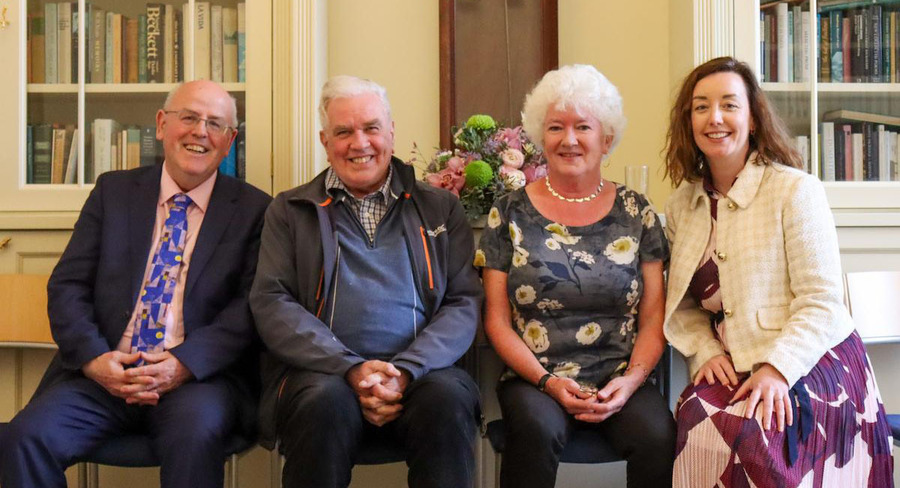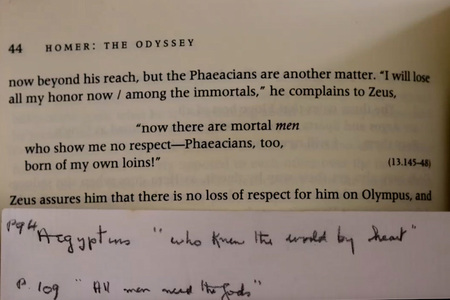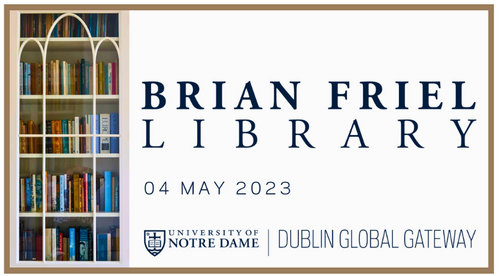Brian Friel Library launched at Notre Dame Dublin

On May 4th, 2023, the University of Notre Dame Dublin Global Gateway launched and dedicated the Brian Friel Library at O'Connell House.
Anne Friel, Brian Friel's wife, generously donated his personal library to the Notre Dame Dublin Global Gateway a few years after the dramatist's death in 2015. The library launch and dedication was attended by the friends and family of Brian Friel and the actors, artists, and authors he worked and collaborated with in his long, successful career.
"Brian Friel was the most globally significant Irish dramatist of his generation," remarked Kevin Whelan, Michael Smurfit Director of the Notre Dame Dublin Global Gateway. "We thank Anne Friel for her extraordinary generosity in gifting the library of her husband to O'Connell House. It is a mark of the respect in which the University of Notre Dame is held in Ireland over the last 25 years."
Brian Friel is not only widely regarded as one of the greatest Irish playwrights alongside the likes of Oscar Wilde and Samuel Beckett, but one of the greatest playwrights in the English-language, compared to contemporaries such as Arthur Miller, Harold Pinter, and Tennessee Williams.
“[William] Blake the great poet wrote, ‘To see a world in a grain of sand.’ What Brian [Friel] does is he brings this ethos to the stage, and in the tiniest, smallest village, the Ballybegs of this world, you can understand the human condition.”
Dr. Paul Murphy, Senior Lecturer at Queen’s University Belfast in the School of Arts, English, and Languages, gave a keynote addressing why Brian Friel really matters. He is the project lead of the "Friel Reimagined" digital archive, a collection of over 3,000 manuscripts and working drafts of Friel’s five most well-known plays: Philadelphia, Here I Come! (1964), The Freedom of the City (1973), Faith Healer (1979), Translations (1980), and Dancing at Lughnasa (1990).
“His understanding of how people tick, how small places work, means everyone can understand him. I can’t think of a playwright that has traveled so far across the world and made an impact on so many people over such a long period of time as Brian has. That’s why Friel really matters,” Murphy concluded.

Friel’s work continues to be produced in New York, London, and Ireland, of course, and is widely staged throughout the rest of the world. The most recently translated work is that of the aptly titled Translations, a play that grapples with the preservation of language and culture under colonial threat.
Ukraine's National Theatre, the Lesya Ukrainka National Academic Drama Theatre, felt deeply connected to the fictionalized Irish-speaking community of Baile Beag, a County Donegal town that is razed under a new wave of British occupation in the 1830s—its native language and place names erased with it. The Ukrainian production of Translations was originally staged in Kyiv in October 2022 as an act of resistance in the middle of Russian invasion. It is now touring at Ireland's National Theatre, the Abbey Theatre, in June 2023.
The Brian Friel Library at O'Connell House was formally dedicated by Judy Friel, Brian's daughter, on behalf of his wife Anne Friel. Some of Brian's favorite poetry was read by Stephen Rea, Oscar-nominated actor and one of the co-founders of the Field Day Theatre Company, alongside Friel, Seamus Heaney, and Seamus Deane, the first Professor of Notre Dame’s Keough Naughton Institute for Irish Studies.
“Brian Friel was a dramatist who most used music as a way of expressing emotion,” Whelan said as he introduced, at the conclusion of the evening, a music tribute by traditional Irish singer Maighread Ní Dhomhnaill and composer and cellist Neil Martin who performed one of Friel's favorite tunes, "The Minstrel Boy" (1813) by Thomas Moore.
“Brian understood sometimes that silence is the most eloquent thing we have, and sometimes music takes up where words leave off.”
